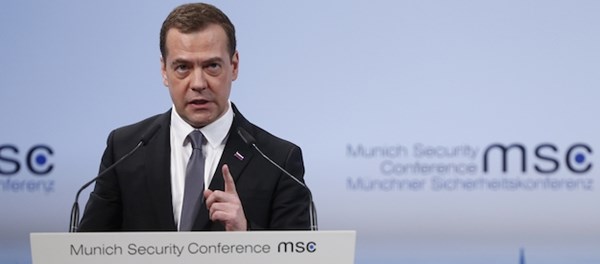In Munich, Medvedev shows that he is no Longer the 'Good Cop'
German media covered the International Conference on Human Security
Debates on issues concerning world policy at the Munich Security Conference, as the Berlin newspaper Der Tagesspiegel observed, constantly varied between skepticism and hope; and often both would come from the mouth of the same politician. John Kerry, the United States Secretary of State, in describing the current international climate, stated pessimistically that the world may not have ever faced so many crises of troubled states at the same time. However, Kerry ended with a positive message, “We will not be defeated by these crises. Europe and America have overcome even graver threats.”
The central event of the second day of the conference was a statement by Dmitry Medvedev, the Prime Minister of Russia. If in previous years there was a separation of roles between Putin and Medvedev similar to a ‘good cop/bad cop’ scenario, as Der Spiegel writes, in Munich the Russian Prime Minister who was considered to be a liberal reformer with an affable and light face, conveyed a different picture. His severe tone, salvo like sentences and thundering reproaches reminded listeners of Russian President Putin’s Munich speech in 2007.
The phrase “the new cold war” in the Prime Minister’s speech, as the German news magazine observed, in fact, reflects Russia’s disappointment with world events for the last 25 years. From Moscow’s point of view, confrontation with the West occurred instead of partnership; the expansion of NATO and the European Union to the east took advantage of a weakened Russia.
The Russian Prime Minister rhetorically asked, “Who is to blame?” and immediately answered his own question, “The West,” regarding the conflicts in Ukraine and Syria. Among the accusations and reproaches against western partners, Der Spiegel noted, there were almost unnoticed passages concerning Russia’s readiness to cooperate in the common fight against radical Islamic terrorism and managing the Syrian migration crisis.
As a matter of fact, the newspaper notes that the report of Sergey Lavrov, the Russian Minister of Foreign Affairs, did not help to defuse tensions. Lavrov held his speech deliberately monotonously, questioning the progress achieved during the negotiations on Syria.
The German Foreign Minister, Frank-Walter Steinmeier, in his statement after Medvedev’s attempt to reduce tensions stated, “We are certainly not in a cold war.” He continued by focusing on the question of refugees and urged Europe to make steps towards each other and come together in times of crisis.
“We must fight for Europe,” Steinmeier concluded, “otherwise, in a year, at the annual conference in Munich, we will deal with a completely different continent.” According to the German media, the concern for the fate of Europe was evident in discussions with the Presidents of Poland, Lithuania, and Finland.
Polish President Andrzej Duda harshly criticized Germany, who, according to him, is not always ready to reflect the priorities of neighbors and EU partners; this undermines the atmosphere of trust throughout Europe. In his comments, Duda was referring to the position of the German Government on the Nord-stream Pipeline 2. Poland is determined to block the second stage of the gas pipeline construction; however, Berlin does not want to influence the project officially under the pretext that this project is commercial and not political.
The Presidents of Lithuania and Finland were in favor of further increasing the presence of NATO in the Baltic. The President of Finland, Sauli Ninistö, stated his position in a frank and transparent manner, “It is Russia who is involved in all recent events in our region and in Syria. We have to tolerate the differences of opinion with Moscow as it is too close to us.”
The Munich Conference, Die Welt notes, in general demonstrated that there is a deep rooted mistrust in current international relations, especially between the West and Russia. Europe sees Moscow as a threat since, starting with Ukraine, they have tested the security system in Europe, and now, as was discussed often on the sidelines of the conference, intend to further destabilize the situation with new flows of Syrian refugees.
The Kremlin, in turn, accuses the West of the growing “Russophobic trend.”
As evidence of the high tensions at the conference, Die Welt observes, was an unusually acute statement by the Secretary General of NATO, Jens Stoltenberg. He warned Russia to abstain from the use of nuclear weapons in armed conflicts and noted that, “The deterrent forces of the North Atlantic Alliance also possess nuclear capabilities.”
The closing statements of the conference were made by U.S. Senator John McCain, whose speech, according to Frankfurter Allgemeine Zeitung, could be considered as the official position of the new U.S. Administration, should the Republicans win the upcoming election. In particular, McCain stated that the Russian President is not interested in a partnership with the West. The American Senator is convinced that Putin sees Syria as a training ground for his army and seeks to create a Russian military outpost of “New Kaliningrad or new Crimea.”
After the conference each year, a medal is awarded in honor of one of the original conveners of the International Security Forum, Ewald-Heinrich von Kleist-Schmenzin. The medal is engraved with the motto, “Peace through dialogue.” Upon making their assessment of the events of this year’s Munich Conference, the newspaper Süddeutsche Zeitung, believes it should instead read, “Embarrassment through dialogue.”
